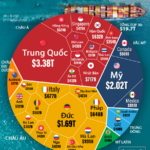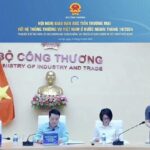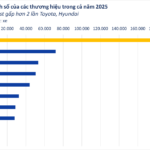Don’t Just Rely on Legal Frameworks
At the seminar, Ngo Thanh Tung, VILAF Lawyer and VIAC Arbitrator, emphasized that Resolution 68 considers private enterprises as the most important in the economy, while previously, this role belonged to state-owned enterprises. However, no matter the position, it is not enough; what matters is that there must be support and conditions for development. If there is no subsequent resolution, the previous one will be difficult to implement.
Mr. Tung believes that Resolution 66 on institutional and legal reform is a strong resolution that emphasizes reform and is likely to be implemented even faster than Resolution 68. Specifically, Resolution 66 states that by 2025, laws must be amended, and all existing “bottlenecks” in the legal system must be removed; by 2027, the entire legal system must be renewed to suit the economy; by 2028, the Vietnamese legal system must become one of the three most advanced legal systems in ASEAN; and by 2045, Vietnamese law must be compatible with international law.
The novelty here is the specific timeline for the legal authorities to act. This is a significant change in the thinking of the political system. It is easy to see the urgency and synchronization between the Party, the Government, and the National Assembly. Mr. Tung believes that this is genuinely good news for the business community.
There have been many notable policies recently on improving the business environment, supporting access to land, credit, public procurement, science and technology support, innovation, digital transformation, and supporting small and medium-sized enterprises. However, if it only stops at the documents, it is meaningless, but the recent reality has shown some hope.
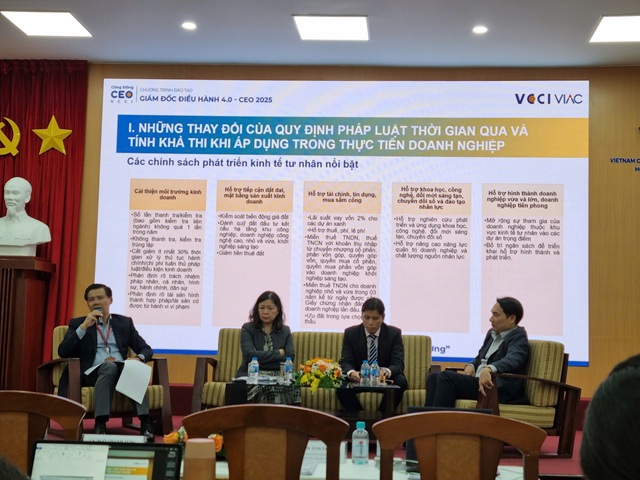 Mr. Ngo Thanh Tung (holding the mic) shared at the seminar – Photo: Huy Khai
|
However, despite the changes, businesses still face many challenges. “People think that reducing the tax rate from 10% to 8% will help businesses, but in fact, it doesn’t solve any problems. The most important thing is that the administrative system does not create unreasonable difficulties and obstacles for businesses” – Mr. Tung shared.
The biggest obstacle is still people – those who implement this policy, whether they will be a “new bottle of old wine” or truly change. Businesses also need to change their mindset and not just rely on the state.
Promoting Legal Governance in a Fierce Context
Assessing the current context of international trade, Ms. Dinh Anh Tuyet, Head of IDVN Law Office, VIAC Arbitrator, and VMC Mediator, believes that social responsibility is no longer a choice but has become a mandatory obligation. If enterprises do not change and comply, they will lose the market, suffer business losses, and even be handled for violations. Not knowing cannot be a reason for exemption from responsibility. This is the fierceness of the international business environment.
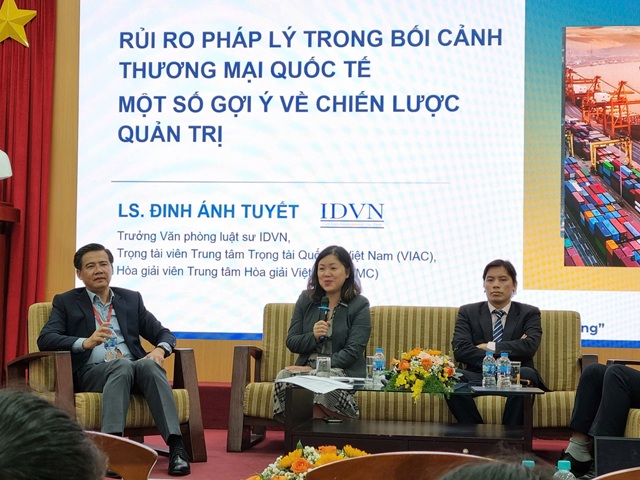
Ms. Dinh Anh Tuyet shared at the seminar – Photo: Huy Khai
|
According to Ms. Tuyet, the new context of international trade revolves around four main factors.
First is geopolitical conflict, trade war, and economic instability. Conflicts and wars are escalating, directly affecting the market, causing businesses to lose opportunities or be interrupted. Or, with the trade war, there are no bullets, but the intensity is no less severe. Under President Donald Trump, the US has set new rules by increasing tariffs and even blocking the WTO’s dispute resolution mechanism. Free Trade Agreements (FTAs) in which Vietnam participates, which once opened up great opportunities, are now at risk of being nullified by protectionist policies from major powers. Vietnam once hoped to benefit when investors left China, but we were also hit by US high taxes because we were considered a “gateway” for Chinese goods. This poses a problem for the supply chain.
Currently, many countries are devaluing their currencies to promote exports, making Vietnamese goods less competitive. Vietnam is under pressure to devalue its currency to face pressure to repay foreign debts, but if it does not, it will lose its competitive advantage compared to countries with cheaper currencies. In the past three years, many large enterprises have complained about difficulties. In addition, political instability has also increased transportation costs.
Second, the international and domestic legal framework is unstable. A typical example is that large markets such as the US and the EU closely link trade with ESG (environmental, social, and governance) standards. Not only complying in the country, Vietnamese enterprises must also be responsible for the entire supply chain, from raw materials, labor conditions to environmental emissions. This is a very significant risk, forcing enterprises to strictly control the supply chain.
Third, technological change and payment methods. The change in technology, the explosion of e-commerce, blockchain… fundamentally change the way of doing business. Enterprises that do not keep up with technology will be left behind. In addition, high-tech crimes are becoming more and more sophisticated, such as email impersonation, changing the account to receive money, or risks in international payment.
Fourth, the environment, natural disasters, and epidemics can also break all business plans, and COVID-19 is a specific example.
All these fluctuations lead to many legal risks for businesses. According to Ms. Tuyet, enterprises can manage risks through updating and reviewing legal regulations; legal review of partners; compliance programs; and risk minimization through contract drafting and negotiation.
Also sharing about contract management, Mr. Nguyen Trung Nam, Founder of EPLegal, Deputy Director of VMC, and VIAC Arbitrator, stated that this is an extremely important method, although it is only a part of risk management. In fact, many entrepreneurs only care about prices and progress and ignore other terms. When a dispute arises, they review the contract, but by then, it is often too late.
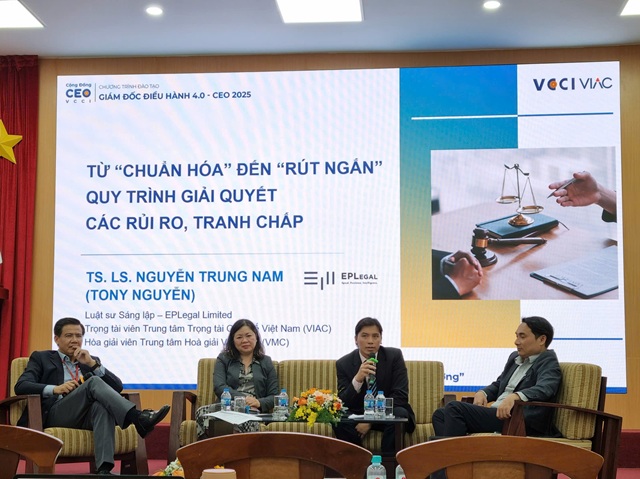
Mr. Nguyen Trung Nam (holding the mic) shared at the seminar – Photo: Huy Khai
|
In international trade, disputes usually fall into two groups. The first is enterprises that deliberately do not perform the contract when the market changes. For example, when the price of cashew nuts or steel increases, some enterprises try to avoid delivery or refuse to receive goods. They forget that the contract has a legally binding value. When violated, the partner can completely sue the arbitration. The second group is enterprises that are defrauded or the partner runs away. Many cases of Vietnamese enterprises exporting wood and furniture to Europe, signing contracts worth millions of dollars, but when defrauded, they give up, do not find out what their rights are to get them back. This is a very dangerous mindset because the enterprise loses everything and does not draw any legal lessons.
According to Mr. Nam, enterprises should not avoid disputes. When the market changes, use the contract tool to handle it because the contract always has risk-hedging clauses. Avoiding disputes will only make enterprises lose their reputation and suffer long-term damage.
Huy Khai
Unlocking Trade Potential: Nghe An’s Soaring Exports Reach $2.33 Billion Landmark in Seven Months
“The manufacturing industry, exports, retail sales, and revenue collection all exhibited positive growth in July 2025, painting a vibrant picture of Nghe An’s economic landscape. However, the aftermath of Tropical Storm No. 3 inflicted severe damage on many western localities in the province, underscoring the urgent need for recovery and development initiatives.”
The World’s Top 30 Export Economies: Is Vietnam on the List?
The infographic showcases the top 30 exporting economies in the world, based on data from the World Trade Organization (WTO).



